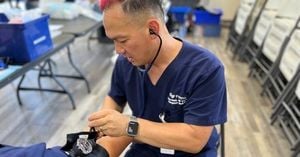This week, the battle against HIV/AIDS faced significant challenges due to the recent halt of over $400 million from the President's Emergency Plan for AIDS Relief (PEPFAR). The U.S. Secretary of State, Marco Rubio, responded to mounting concerns about the funding freeze by announcing an "Emergency Humanitarian Waiver" aimed at ensuring life-saving antiretroviral (ARV) treatments for millions of individuals residing within 55 countries, including the most affected regions like South Africa.
The funding freeze emanates from President Trump's recent executive order for an immediate 90-day face-off on all foreign assistance, which has ignited widespread anxiety among political leaders and health organizations alike. Fears are growing as many worry these cuts could reverse years of progress made against HIV/AIDS, particularly across the African continent where the crisis remains severe.
According to UNAIDS, approximately 20 million individuals, two-thirds of the global total receiving HIV treatment, rely heavily on PEPFAR's life-saving initiatives. UNAIDS Executive Director Winnie Byanyima voiced her support for the humanitarian waiver, commenting, "UNAIDS welcomes this waiver from the US government, which ensures millions of people living with HIV can continue to receive life-saving HIV medication during the assessment of US foreign development assistance. This urgent decision recognizes PEPFAR's role and restores hope to people living with HIV." Byanyima's sentiments echo the collective worry shared by many health advocates concerning the potential repercussions of funding interruptions.
South African Health Minister Dr. Aaron Motsoaledi highlights the extent of the issue, noting, "5.5 million South Africans are currently on ARV drugs, and PEPFAR contributes 17% of our overall investment against HIV, which stands at R44.4 billion." He emphasized the need for sustained international support as South Africa's healthcare system heavily relies on global initiatives to combat the HIV epidemic.
The political ramifications of this funding pause are leading certain leaders, including Mmusi Maimane of BOSA, to label the cuts as not just medical shortcomings but as social justice violations. Maimane retorted, "A pause in funding will have devastating consequences for millions of South Africans who rely on these programs for survival." His statement resonates strongly within communities deeply affected by the HIV crisis, reminding us of the larger societal influences just beyond healthcare.
Contrastingly, the recent change brought forth by the funding freeze has encouraged nations like Nigeria to pursue self-independent responses. Nigerian Minister of State for Health and Social Welfare Iziaq Salako articulated his perspective, stating, "This is likely to go down, which I believe is a wake-up call for us. We need to strategize and explore avenues for raising domestic and alternative funds." He underlined the urgency for his country to establish funding frameworks less reliant on foreign assistance.
Salako emphasized the need for collective global responsibility, stating, "The world is a global village and what happens in one country affects the other country." This approach calls for concerted efforts among nations to bolster vulnerable health systems amid uncertainties. He also suggested innovative avenues like crowdfunding to support HIV programs to lessen the financial burden arising from the halted funding.
The growing worry surrounding the future of PEPFAR’s funding has prompted political factions within South Africa to rally for reinstatement. The Democratic Alliance has echoed the urgent plea for the U.S. government to restore funding, stating, "Investment in global health initiatives directly reinforces international security and enhances America's standing globally." They argued for immediate action as the stakes are alarmingly high for the millions who depend on these life-saving programs.
With the U.S. government currently reviewing its foreign assistance strategies, health advocates remain on high alert, stressing the urgency to maintain support for those battling HIV/AIDS. The groundswell of voices from health officials, political leaders, and civil society groups is clear: every day counts, as disruption of care could mean life or death for vulnerable populations.
The current impasse serves as both a dire warning and pivotal moment calling for holistic responses to health challenges faced by developing nations. With their leaders and communities forcefully advocating for sustained support, the emphasis on collaborative action could be the key to avoiding regression and ensuring millions continue to receive the necessary treatments for HIV/AIDS.



